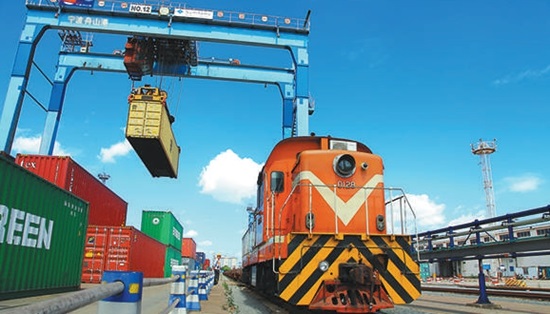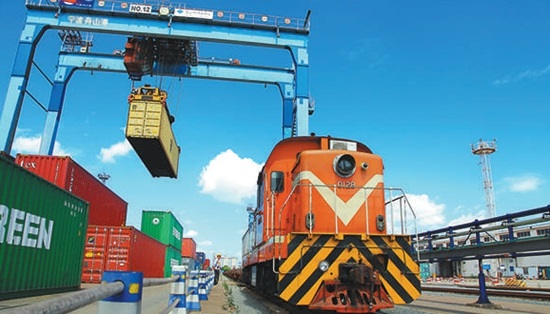
70th Anniversary of Diplomatic Ties Witnessed A New Starting Point of Cooperation Between China and Central and Eastern European Countries (CEEC)
Abstract: the cooperation between China and CEE countries in specific areas has become institutionalized and a platform for such cooperation has formed.
 Picture: containers to CEE countries are packed in Beilun Port of Zhoushan, Ningbo. (Source: Economic Daily)
Picture: containers to CEE countries are packed in Beilun Port of Zhoushan, Ningbo. (Source: Economic Daily)
As China celebrates its 70th birthday, it also ushers in the 70th anniversary of the establishment of diplomatic relations between China and some CEE countries. President Xi Jinping exchanged congratulations respectively with his counterparts of Bulgaria, Romania, the Czech Republic, Slovakia, Hungary and Poland on the 70th anniversary of the establishment of bilateral diplomatic ties. In parallel, Chinese Premier Li Keqiang also exchanged congratulatory messages with his counterparts of the six countries.
Bulgaria, Romania, the Czech Republic, Slovakia, Hungary and Poland are among the first group of countries to recognize the status of the People’s Republic of China (PRC) upon its foundation and set up bilateral diplomatic relations with China. . At the beginning of the founding of PRC, some CEE countries provided selfless help to China’s socialist construction, for which Chinese people are quite grateful. In October 1971, the resumption of the legitimate seat of PRC in the United Nations could not succeed without the votes of CEE countries. A The relationship between China and CEE countries has fluctuated over the past 70 years, but thanks to the launch of the cooperation mechanism between China and CEE countries (“16 + 1 Cooperation”) in 2012, the relationship between China and CEE countries has stepped into the fast track of stable development. Greece officially joined the 16+1 grouping in April 2019, making it 17+1. After 70 years of ups and downs, China’s relations with CEE countries stand at a new historical starting point.
First of all, the economic status of China and CEE countries has been far more enhanced. After 40 years of reform and opening up, China has become the second largest economy and the first largest trading country in the world, and its economic strength and technological innovation capacity have been greatly improved. The CEE countries have established a market economic system and become the important part of emerging markets around the world. Their catch-up process has accelerated significantly that nine of them (which are also new member states of the EU) have ranked among the high-income countries. The enhanced economic status of China and CEEC provide a basis for China and CEEC to seek high-level cooperation.
Secondly, the 17+1 grouping has become an effective, practical and cross-regional cooperation platform. In 2012, the Warsaw Meeting between China and CEE leaders ushered in a new era of China-CEEC cooperation, and the “16 + 1 Cooperation Mechanism” was officially formed. In April, 2019, the 16+1 grouping has been updated to 17+1. Since the establishment of the China-CEEC cooperation mechanism seven years ago, China’s cooperation with CEE countries is increasingly extensive, including political dialogues, economic cooperation, and cultural exchanges. Key areas of cooperation include connectivity, trade and investment, financial cooperation, and scientific and technological cooperation. As the China-CEEC cooperation become institutionalized, a cooperation platform in specific areas has formed, including tourism, agriculture, forestry, investment promotion, local cooperation, technology transfer, infrastructure, logistics, think tank exchange, education cooperation, etc.
Thirdly, China’s trade and investment with CEE countries increased significantly. The trade volume between China and the 16 CEE countries was $82.23 billion in 2018, an increase of 55.4% compared with 2011. At the same time, Chinese companies have invested more than $10 billion in CEE countries, and 16 CEE countries have invested more than $1.5 billion in China, involving machinery manufacturing, chemical industry, finance, environmental protection, logistics, new energy, etc. For example, a series of energy and transportation infrastructure projects undertaken by Chinese enterprises in western Balkan countries have been successfully implemented. At the same time, financial cooperation between China and CEE countries is deepening day by day, local cooperation has achieved remarkable results, and cultural exchanges are increasingly active. Ambassador Huo Yuzhen, special representative for China-CEEC cooperation, believes that “17+1 Cooperation” has become the most dynamic, typical and cross-regional cooperation mechanism. Former Slovenian President Turk said that “17+1 Cooperation” is a practice of multilateralism in a real sense. Looking forward to the future, China and CEE countries still have great potential for cooperation in trade and investment, finance, energy, science and technology, connectivity, etc.
What’s more, the construction of Belt and Road Initiative (BRI) will help to deepen cooperation between China and CEE countries. “17+1 Cooperation” is a cross-regional cooperation platform between China and CEE countries, while BRI is a grand vision for China to promote global development and encourage the evolution of the global governance system. BRI has connected Asian and European economic circles. Therefore, the CEE countries play a unique role in strengthening economic ties and promoting interconnection between Asia and Europe. Since the proposal of BRI, China has signed related cooperation document with CEE countries. Poland, Hungary, Romania and Serbia have become members of the Asian infrastructure investment bank. CEE countries regard BRI as a major opportunity to enhance the cooperation between China and these countries. The “17+1 Cooperation” is not only a platform for promoting the policy communication of BRI, but also a platform for exploring and seeking mutually beneficial and win-win BRI cooperation projects.
At present, the international order is undergoing dramatic changes. Unilateralism, protectionism, economic nationalism and populism have led to unprecedented political uncertainty in the world, and the competition between big powers seems to be overwhelming the cooperation of them. Therefore, promoting cooperation between China and CEE countries is of strategic significance not only for promoting the balanced development of China-EU relations, but also for jointly addressing global challenges. In 2020, China will host the Leadership Summit of China-CEEC Cooperation discussing major plans and further improving and upgrading China-CEEC Cooperation to a new level.
(Kong Tianping, researcher of the European Research Institute of Chinese Academy of Social Science and the observer of the think tank of haiwai net.)
Source: internet comment haiwainet.
Back



